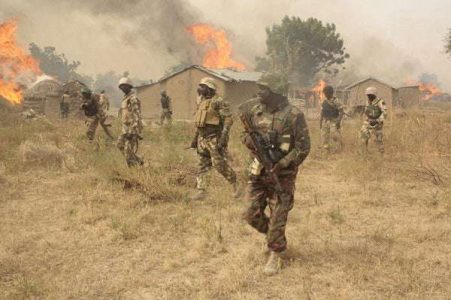
Nigerian authorities are losing the war against terrorists in Borno State
There are few places as conducive to insurgency and terrorism as Borno state in northeastern Nigeria. Grinding poverty, ethnic and religious tensions, illicit networks, environmental degradation, porous international borders, and vast tracts of lightly governed and ungoverned spaces are all features of Borno state.
On account of these, Borno has acted as an incubator for various insurgent and terrorist groups, most notably Boko Haram, Africa’s most deadly terrorist organization. The Islamic State in West Africa Province (ISWAP), Boko Haram, and al-Qaeda affiliate Ansaru, are all active in Borno state and surrounding areas.
Despite the deployment of—at times—over 70,000 Nigerian troops to Borno state alone, all three groups, but most particularly Boko Haram, have maintained their operational tempo. Recent reports indicate that the frequency and complexity of Boko Haram’s attacks are, yet again, on the increase. On May 26, Boko Haram attacked homes, a church, and shops in three villages in the Biu local government area of Borno state.
This attack followed an attempt by Boko Haram to overrun a Nigerian Army forward operating base in Gajigana, a town located only fifty kilometers north of the capital of Borno state, Madiduguri. In this attack, Boko Haram used at least ten technicals mounted with heavy machine guns and recoilless rifles.
On June 2, Boko Haram launched near simultaneous attacks using female suicide bombers on villages located across five different local government areas. In addition to the reported attacks, Boko Haram and other groups carry out robberies, kidnappings, and assaults on an almost daily basis across large swaths of northeastern Nigeria.
The government of Nigeria and the Nigerian Army have repeatedly declared the defeat and weakening of Boko Haram and Islamic State West Africa Province (ISWAP). However, the tempo and geographic extent of recent attacks by these groups—Boko Haram in particular—indicates that these organizations’ operational capacity remains undiminished and may be on the increase yet again. Boko Haram’s resiliency is due to the almost ideal conditions for insurgency in Borno.
It is also due to the Nigerian Army and security services’ failure to adopt a more agile and responsive force structure. Rather than address these failures, the Nigerian Army is making moves that signal a retreat to Boko Haram and, most importantly, to the Nigerian citizens they are meant to protect.
Nigerian officials announced the plan to establish so called “super camps” in the summer of 2019. The plan was met with immediate criticism in the Nigerian press despite claims by army officials that the super camps would in fact facilitate the fight against Boko Haram and other insurgent groups. The proposed plan eliminates smaller outposts in favor of creating a small number of highly fortified bases located in or on the outskirts of major towns.
Nigerian troops will use the super camps as bases from which to launch extended patrols of surrounding areas. However, critics of the plan point to the fact that these patrols will not replace the permanent presence of troops at the smaller outposts. The deteriorating security situation in Borno state, and indeed in parts of surrounding states, points to the weaknesses of the super camp plan.
Instead of contributing to the efficacy of operations, as Nigerian authorities claimed the super camp plan would, the frequency and effectiveness of Nigerian operations against Boko Haram have declined. The lack of forward bases impacts intelligence gathering and, ironically, may make Nigerian troops more vulnerable to attack. It was the ability of Boko Haram and other groups to attack and overrun the smaller camps that, far more than increasing the army’s effectiveness, forced the Nigerian Army to create super camps.
Yet, extended military patrols from the super camps mean that they are often more vulnerable to attack. The patrols are forced to operate farther away from the bases where already limited air support is further stretched. Boko Haram and ISWAP both enjoy excellent human intelligence and are likely to be more up to date on the movement of troops in and out of the super camps than military authorities in Abuja. Both groups also have a long history of recruiting motorbike drivers (known as okada or achaba in Nigeria) as couriers and informants. Boko Haram and ISWAP also use motorbikes to move around rural and urban areas quickly and inconspicuously since motorbikes are ubiquitous in many parts of Nigeria and the larger Lake Chad Basin.
Boko Haram and ISWAP’s agility and low profile contrasts with the plodding high visibility movements of Nigerian forces. The collapse of smaller camps into heavily fortified super camps has further compromised the Nigerian Army’s ability to quickly field units capable of responding to attacks. Deployments from the super camps are heavily armored, slow moving and easily observed.
While the use of larger well-protected and heavily armed units has reduced casualties among the army, this also means that the Nigerian Army is even less capable of securing and holding territory. Boko Haram and ISWAP detect the troop deployments, monitor their movements and withdraw rather than engage the armored columns. When the troops return to their bases, Boko Haram and ISWAP move back in and reassert control.
Source: Jamestown





